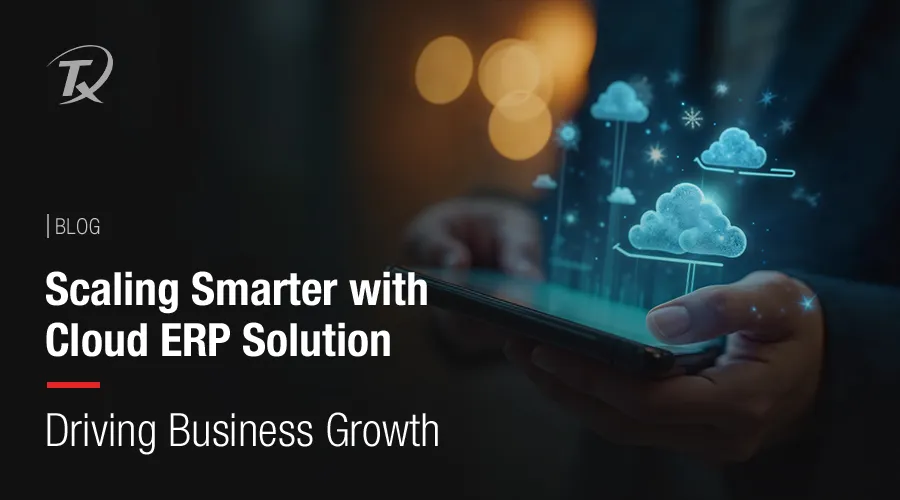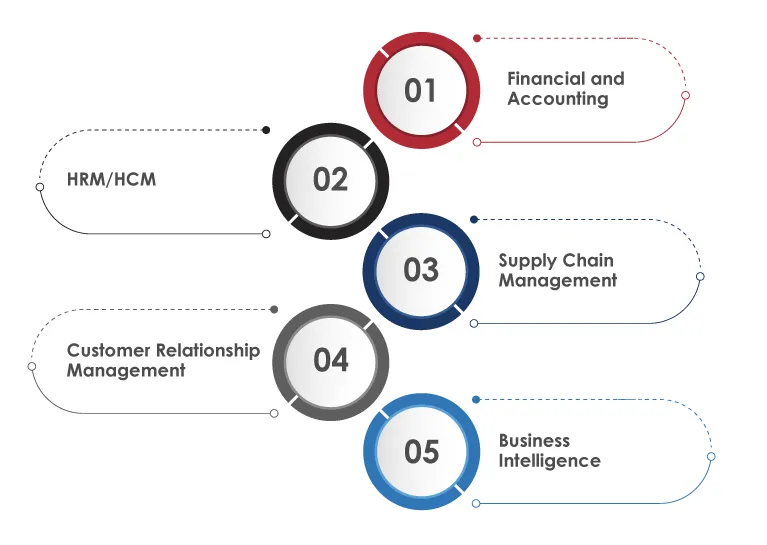Recommended Blogs
Scaling Smarter with Cloud ERP Solution – Driving Business Growth

Table of Contents
- Understanding a Cloud ERP Solution
- On-Premises ERP vs Cloud-based ERP Solution
- Cloud ERP Software Solution Components
- 5 Types of Cloud ERP Software
- Why Does Your Business Need a Cloud-based ERP Solution?
- How can Tx help ensure the Quality of Your Cloud ERP Solution?
- Summary
Today’s businesses want to scale and expand their operations with the changing technology trends. It’s no secret that firms wish for more than just expansion. They want technologies that are flexible, easy to scale, quick to respond, and unbreakable under strain. Cloud ERP solution is one such technology that enables firms to control their operations and scale their business under a single umbrella. No more isolated departments, complicated software, and outdated task enablers for business activities.
Cloud-based ERP systems are transforming how enterprises run their businesses and adapt to new conditions to deliver long-term value. These systems enable organizations to access the software via the internet anywhere, anytime. All they need is a stable connection and a reliable browser.
Understanding a Cloud ERP Solution
Cloud ERP is an internet-based enterprise resource planning software solution that gives businesses access to essential applications without time and location constraints. It is highly scalable and easy to integrate and upgrade. Some consider it a backbone of the IT infrastructure as it offers advanced functionalities to manage the organization’s core operations. A cloud-based ERP solution is hosted on a provider’s computing platform and is delivered as a “software-as-a-service ERP.” This means businesses don’t directly own the software; instead, they use it on a subscription basis.
In a report, IDC said that the demand for cloud ERP solutions will grow steadily due to their potential to access and analyze large datasets in real time. A cloud ERP system is always online, and the service provider handles the security updates. It decreases the total cost of ownership compared to traditional ERP systems hosted on on-premises servers. Cloud ERPs are also accessible via mobile devices and desktop computers. Enterprises can integrate various business applications to keep themselves running efficiently as they work towards improving the customer experience and delivering value-driven business outcomes.
On-Premises ERP vs Cloud-based ERP Solution
Aspects |
On-Premises ERP |
Cloud-based ERP |
|
Initial Investment |
High upfront cost for licenses and hardware |
Lower initial cost due to subscription-based pricing |
|
Upgrade Responsibility |
Enterprises must plan and execute upgrades on their own |
Vendor handles upgrades with minimal disruption |
|
Resource Requirements |
Requires an in-house IT team for support |
Less reliance on internal IT staff |
|
Customization Impact |
Custom changes can delay upgrades |
Limited customization, and it is easy to upgrade |
|
Implementation Timeline |
Typically longer due to setup and infrastructure |
Faster setup, especially for standard processes |
|
Access Control |
Controlled entirely by internal policies |
Depends on the vendor’s security and access setup |
|
Disaster Recovery |
Must be planned and maintained by the business |
Included in vendor service; often automated |
|
Data Location |
Stored locally, enterprises have complete physical control |
Stored in vendor’s data centers (location may vary) |
|
Vendor Dependency |
More independent post-deployment |
High reliance on the vendor for ongoing operation |
|
Scalability Decisions |
Requires hardware upgrades and planning |
Can be scaled up/down quickly through the vendor |
Cloud ERP Software Solution Components

A cloud-based ERP software offers financial and accounting features at its core. The type of applications, modules, and features a company selects to leverage depends on its business needs and industry type. Let’s look at the core components of cloud ERP that integrate various business functions, streamline operations, and provide a unified platform for data management and workflow automation:
Financial and Accounting:
Handles budgeting, accounts payable and receivable, and financial reporting necessary to manage the money-related aspects of a business.
HRM/HCM:
Focuses on workforce handling, including payroll, employee benefits, talent acquisition, and other HR-related processes.
Supply Chain Management:
Deals with planning, coordinating, and executing the flow of data, goods, and funds related to the supply chain.
Customer Relationship Management:
Helps manage customer interactions, including contact management, sales forecasting, customer support, and lead tracking.
Business Intelligence:
Provides data analytics and reporting functionalities, enabling enterprises to gain insights into performance and make informed decisions.
Other common modules in a cloud ERP software solution include order management, manufacturing, warehouse management, and inventory management.
5 Types of Cloud ERP Software

One thing everyone should know is that not all clouds are equal. Businesses that have retrofitted their legacy ERP software via their internet-connected data centers may miss out on the benefits of a cloud ERP solution. Instead of such an approach, there are multiple cloud-based ERP software that businesses can utilize based on their requirements:
Single-Tenant SaaS:
This ERP software solution serves only one organization. The data is hosted on private servers that run a single version of this ERP software. Cloud ERP vendors can also allow clients to run it privately or in a shared space.
Multi-Tenant SaaS:
This type of ERP solution serves multiple organizations simultaneously. Although organizations may use the same software on the same server, their data will remain protected and secure from others.
Public Hosted:
The service provider owns this cloud-based ERP solution, and multiple enterprises share the computing space. Despite this, each enterprise’s data and applications remain inaccessible to others. Public cloud examples include Google Cloud, Oracle Cloud, and AWS.
Private Hosted:
The ERP software is hosted on an enterprise private server. It offers maximum control and security for data and applications, but requires initial infrastructure investment.
Hybrid Cloud:
This ERP solution combines on-premises software with private or public cloud for services, storage, and computing.
Why Does Your Business Need a Cloud-based ERP Solution?
• Avoid hefty upfront costs associated with traditional ERP hardware and software setup.
• Its subscription-based model is affordable and manageable for businesses of all sizes.
• No need to maintain costly on-site traditional ERP infrastructure.
• Easy to scale as your business grows without complex upgrades.
• Add/remove users and expand functionality per your requirements with minimal disruption.
• Access the application/services anywhere, anytime, with an internet connection.
• Real-time access to data and decision-making capabilities.
• Up-to-date visibility across financial, sales, inventory, and other segments.
• Helps make quicker, data-driven decisions based on real time information.
• The service provider handles the software updates and maintenance.
• Break down departmental silos between HR, sales, and finance.
• The team can share information more effectively and enhance productivity with streamlined communication.
• Cloud providers invest in strong security measures, including encryption and regular backups, ensuring higher security than on-premises solutions.
• Facilitate easy integration with CRM, marketing tools, HR, and other software systems.
• Easy to store and restore data in the event of disruption.
• Track orders, manage communications, and deliver personalized services.
• Flexible and cost-effective, enabling businesses to adapt to market changes quickly.
How can Tx help ensure the Quality of Your Cloud ERP Solution?
Thousands of enterprises globally are using cloud ERP solutions, which enable businesses to fast-track their transformation efforts. However, despite this, they need a QA solution to ensure seamless implementation of a cloud-based ERP system. Tx, the leading vendor in digital assurance and quality engineering services, helps you ensure the quality and reliability of your cloud ERP solutions.
• Our comprehensive functional and performance testing ensures that every aspect of your cloud-based ERP solution is secure, robust, and high-performing.
• We help protect your business data by conducting security assessments, compliance checks, and penetration testing.
• Our experts rigorously test ERP integration with CRM, payroll, and other essential platforms to ensure error-free data flow across your enterprise ecosystem.
• We leverage automation frameworks to ensure new updates or changes do not break existing functionality, keeping your ERP system stable and dependable.
Summary
Cloud ERP solutions redefine how businesses grow by offering flexibility, real-time access, and seamless operations across departments. With lower upfront costs and easy scalability, cloud-based ERP empowers organizations to make faster, data-driven decisions while enhancing collaboration and security. Tx helps ensure the reliability of these solutions through comprehensive testing services, including functional, performance, security, and integration testing. We help our clients confidently adopt and optimize cloud ERP systems, supporting smooth operations and sustainable growth. To know how Tx can help, contact our experts now.
Discover more
